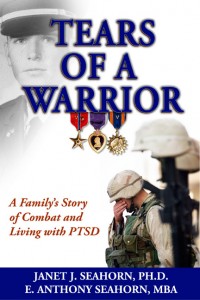Jul
22
This is my Quilt of Valor
Filed Under Healing, Life, Quilts of Valor, Tears of a Warrior, Today's War, War, Women in Combat | Comments Off on This is my Quilt of Valor
Guest Post by Carrie Hagen
SGT-TN Army National Guard
This is my Quilt of Valor.
There are many like it, but this one is mine. My Quilt is my gift. It represents my service life. I will appreciate it, as it was made in appreciation of me. My Quilt, without being made with love and support, would be meaningless. Without love and support, my service is meaningless. I must keep my Quilt always. I must respect those who show respect to me. I must remember my time of service along with those who remembered me. I will… My Quilt and I know that what counts in serving our country is not the places we’ve gone, the things we’ve done, or the battles we’ve fought.
We know standing for those in need makes it count. For them, we will stand… My Quilt of Valor is proud, as am I, because it reflects kindness found in American life. Thus, I will love it as a brother. I will love its wearing, its tearing, its patterns, its threads, its comfort, its true meaning, and its creators.
I will keep my Quilt dear and close, even as I am held dear and close. We will become part of each other. We will… Before God, I thank my supporters. My Quilt and the military are symbols of the services dedicated to our country. We are the pride of the people who made us. We will hold the memories of our military service life.
So be it, until we lay to rest and there is no enemy, but peace!
May
7
NEW TERM FOR PTSD: POST-TRAUMATIC STRESS “DISORDER” becomes “INJURY”
Filed Under Post-Traumatic Stress "Injury", PTSD, PTSD treatment, Tears, Tears of a Warrior, Today's War, War Injury | Comments Off on NEW TERM FOR PTSD: POST-TRAUMATIC STRESS “DISORDER” becomes “INJURY”
by Tony & Janet Seahorn
Wow, double Wow, and Wow again! Finally a more accurate term for Post-Traumatic Stress which leaves off the BIG “D”.
It has been a long time coming and we certainly hope that those in charge of giving terms to the various wounds of war will carefully consider renaming PTSD to PTSI– Post-Traumatic Stress Injury. We have constantly said that Post-Traumatic Stress refers to a reordering of the brain neuro networks. But calling it an injury versus a disorder is a huge step in the right direction.
Think about it, we don’t refer to cancer as a disorder, or a broken bone as a disorder. Trauma caused by outside forces essentially is an injury, however, the injury goes far beyond the mere physical damage of an organism; these wounds also impact the soul, spirit, and emotional stability of the individual and are far more challenging to heal.
For the longest time in the early 19th and 20th centuries, cancer was not openly discussed and considered by some as an illness brought on by an impoverished life style both of the mind and body. Afflicted folks often felt responsible for their illness and were shunned by some in their communities. By gaining a more accurate understanding of any problem we are able to provide better treatment and services for both healing and coping.
And so it may be tentatively happening for those struggling with post-traumatic stress. We have heard from several readers about this change of wording. For those who have not yet read about the change in terminology, we are including this short clip from Sunday, May 6th Denver Post:
PTSD MAY GET NAME CHANGE TO HELP VETERANS
It has been called shell shock, battle fatigue, soldier’s heart, and, most recently, post-traumatic stress disorder, or PTSD.
Now, military officers and psychiatrist are embroiled in a debate over whether to change the name of a condition as old as combat. The potential new moniker, post-traumatic stress injury.
Military officers and some psychiatrists say dropping the word “disorder” in favor of “injury” will reduce the stigma that stops troops from seeking treatment.
Let’s hope those with the power to make such a change will give the new term their best consideration. Word/terms do make a profound difference between how we view and treat those who have given so much to our country – along with other sufferers. Calling combat trauma an injury is far more correct than calling it a disorder.
With any luck we can get it right this time.
May
7
A TIME TO REFLECT
Filed Under Tears of a Warrior, Today's War, Trauma, War | Comments Off on A TIME TO REFLECT
by Janet J. Seahorn, Ph.D
It has been some time now since we heard the disturbing news of the young sergeant who massacred civilians inAfghanistan. According to the media, the individual has been indicted with killing seventeen people, nine of whom were children.
During this time I debated whether or not to broach the subject in our blog. Truthfully, I’m still not certain I want to bring this up again given the enormous amount of media attention. Yet, it seems important to at least give some perspective on what others have been sending us through phone calls, e-mails, etc.
No one would dispute that what occurred was inexcusable. The entire incident is pretty disturbing. However, I continue to wonder who, beside Sergeant Bales is answerable for this horrendous act? Where is the government’s responsibility in choosing to commit our country to two wars yet refusing to enact a draft? Where is the government’s moral accountability in allowing less than 1% of our young men and women and their families to shoulder the enormous burden of continual deployment and redeployment four, five, and six times to various combat zones? Where is the military’s obligation in making sure each troop is in top physical and emotional health before ever being sent back to a war when he/she may not be fully combat ready? And lastly, where is the conscience of each and every American citizen who allows so few to serve in combat and bear the burden of an entire country?
Please understand, I am not trying to be critical, but it is crucial that every aspect of this terrible situation be carefully examined. For you see, these are questions we should all be asking if we are going to do better in the future. Because, unfortunately, in our future there will still be wars. What are the lessons to be learned?
In reality, Sergeant Bales is morally, legally, and physically accountable for this terrible deed. He cannot use the argument of having PTSD as the sole contributor for his actions. Millions of past and present veterans have and are suffering with this condition. Yet few ever commit such violent and unforgivable acts. No, according to what we are being told, these murders were committed by Sergeant Bales for reasons yet to be disclosed. However, each of us must question, who else should bear the consequence of such horrific actions? Are we as a nation pushing some of our troops to the breaking point? War is hell and too much war may be even worse!
Then, as I struggle to come to my own personal conclusion, I am reminded of something I have read many times, “There by the grace of God, go I”.
Mar
15
“Tears of a Warrior” eBook
Filed Under eBook, Events, PTSD, Tears of a Warrior, Today's War | Comments Off on “Tears of a Warrior” eBook
by Tony & Janet Seahorn
Oct
15
DOES ANYONE CARE?
Filed Under American Patriotism, Tears of a Warrior, Today's War, Trauma, Troops, Veterans, War | Comments Off on DOES ANYONE CARE?
by Janet J. Seahorn, Ph.D

It’s been on the news and in the papers – the latest studies about our military personnel serving in Iraq and Afghanistan.
The studies done by the Pew Research Center were based on two surveys between July and September (Denver Post, Oct. 6, 2011). One survey focused on military individuals who are currently on active duty along with those who have served but are no longer active. The second survey polled over 2000 adults who had never been in the military.
What disturbed me most however was not the report that many of our troops are either “ambivalent” or do not feel the current wars in Iraq and Afghanistan were “worth the sacrifices”. Nope, what was most unsettling for me was that adults polled who had never served in the military did not give much thought to those serving in combat. Many felt that those who volunteered to serve their country knew what they were getting into.
- 84 percent of these modern-era warriors say the general American public has little or no understanding of the problems they face, with 71 percent of the public agreeing.
- Many Americans agree that since the terror attacks in the U.S., the military and their families have made more sacrifices than the general public. But even among this group, only 26 percent say this gap is “unfair,” while 70 percent say that it’s “just part of being in the military”. (msnbc.com staff and news service reports updated 10/5/2011 5:50:40 AM ET 2011-10-05T09:50:40)
I guess this last research bullet just didn’t sit well with me. Probably because as a family we have lived the aftermath of combat, lived with the ghosts of the dead and dying, and had to cope with the nightmares, anxiety attacks, and flashback memories. It isn’t that any vet or his/her family wants empathy for his/her service, but to read that 70% believe that “it’s just part of being in the military” seems like a really insensitive statement.
I am not sure that any person, young or old, has a true idea of what war and combat is about. I am pretty sure, on the other hand, that none of them had any clue that what they do, see, and experience in hell will stay with them for a lifetime. That the war they fought on foreign soils will follow them home and into their living rooms, relationships, and careers. Few of them had any clue that these things were “just part of being in the military”.
Perhaps, since Vietnam, too many Americans have been too far removed from the sacrifices of war. During WWII everyone on the home front had to give up something for the war. Now, most give up nothing, while those few who serve give up far too much. The very least we at home can do is give two or three minutes each day to say a short prayer for those and their families who serve. Just remembering our military will certainly make us, not merely better people, but a more thoughtful, compassionate nation.
Mar
25
LOST IN WAR
Filed Under Tears of a Warrior, Today's War, Trauma, War | Comments Off on LOST IN WAR
by Janet J. Seahorn, Ph.D

In our book, “Tears of a Warrior: A Family’s Story of Combat and Living with PTSD “, one chapter talks about the “Humpty-Dumpty Effect”. Most people know the children’s nursery rhyme where the poor egg falls off a wall and breaks into numerous pieces that can’t be put back together again. For a veteran, war can be the culprit that pushed Mr. Dumpty off his perch. In our civilian culture we might try and sue for all a person is worth, however in war there are too many different elements to specifically place the blame of a broken body.
The underlying analogy of Humpty-Dumpty is what he lost when he fell and cracked his inner and outer shell. The major damage may be a lost sense of wholeness. One goes into combat young and feeling invincible and often returns in pieces. Pieces when put back will take super gorilla glue to hold together, while some pieces many not mend regardless of the care applied.
Searching for those lost pieces may become a never-ending journey. Putting back the broken eggshells of the body, mind, and heart can be a life-time challenge. The delicate part of the process occurs unexpectedly when hidden memories, ghosts of conflict, and unresolved grief overtake Humpty and rescrambles his being, again and again. It can be a daily occurrence for many vets and their families, and sometimes, in attempting to put the pieces back, we run out of glue.
Finding what was lost in war may be a pointless pursuit, like looking for a coin in a vast sea of sand and rock after it has fallen off a steep cliff. One will never fully retrieve his/her sense of innocence. He will never regain that youthful sense of invincibility known prior to combat. She will never view the world like she did before looking at scenes of devastation, death, and the severely wounded. The security of childhood has been turned into the reality of a sometimes cruel and inhumane world. A world that is different for the veteran than for people back home who have never witnessed war’s bluntness.
Perhaps Humpty may never retrieve or replace his lost pieces or restore the wholeness that existed before war. Yet, being pasted back may bring together a renewed sense of purpose and personal aspirations. Mosaic eggs have their own unique beauty. A beauty that cannot be replicated for each section of the egg is placed in a distinct part of what was once a solid structure. With enough care and support, the shell can once again become sturdy and uniquely whole. As for me, while I am using the sticky stuff, I think I will put a generous sprinkle of glitter and gold that will enable the sunlight to reflect the new dimensions of the outer and inner egg shell.
Maybe our veterans’ youthful wholeness was lost. We will surely grieve its purity. Yet, do not refrain from celebrating the physical and emotional strength of the new Humpty-Dumpty. He, in his full glory, is not lost, only remolded into something with greater substance, courage, compassion, and hopefully a whole lot of sparkle.
Mar
9
UNCOVER THE SUN
Filed Under Combat PTSD, PTSD, PTSD treatment, Tears of a Warrior, Today's War, Treating PTSD | Comments Off on UNCOVER THE SUN
by Janet J. Seahorn, Ph.D

There are so many ways to experience trauma in the world. Combat is just one, but it is one where the impact keeps on giving and giving. For many whose painful experiences occurred once or twice, many seem to be able to get up in the morning and feel grateful for the opportunity to have a fresh new start. The sun shines brighter and the colors of the world are more intense, even if some nights are seemingly unbearable.
The difference between a one time experience and multiple traumatic occurrences is the cumulative effect. The more often an individual faces harrowing life events, the more likely the brain is going to be influenced by those events. Because the brain is sculpted by experience, everything good or bad can make a difference.
We become who we are due to our genetic foundations and our environment. If that environment is nurturing, safe and challenging in a positive way, we have a greater chance to develop into self-confident, cheerful people. If, however, that environment is saturated with violent, unpredictable and dangerous circumstances the brain molds itself into a survival organism in order to hopefully sustain the trauma. The important thing to remember, however, is the age when a trauma occurs. Earlier is not always better.
We know the brain is not fully developed until the mid twenties (especially in males). So what do you think multiple combat deployments do to a developing brain? For many young men and women the outcome is pretty darn complicated. Connections within the brain are changed. Neurotransmitters, those chemicals in the brain that allow us to feel pleasure, prepare for fight or flight, suffer with depression, and other human experiences are changed. The physical organism that controls our behavior is changed. Trauma is serious business with serious effects for many.
For warriors returning from combat, the world is not as bright and welcoming as it was before war. Sense of identity is changed… you leave as a somewhat naive youngster and return as an adult aged beyond your years. PTSD is like having a gray veil placed over the sun. Sure it still shines. Yes, you can feel the warmth of its rays.
Yet, nothing is the same as before you left. Healing from trauma can be the unveiling of the sun. The way to remove that shroud or at least make it lighter is to seek help as soon as possible. You have the strength to Uncover the Sun. More importantly, you deserve to have the full brightness of its rays lighting your days and warming your heart.
Jan
17
WAITING FOR UNCLE SAM
Filed Under Tears of a Warrior, Today's War, Veteran Benefits, War | Comments Off on WAITING FOR UNCLE SAM
by Janet J. Seahorn, Ph.D

A film came out this fall called Waiting for Superman. It was a documentary on the state of education and our public/charter schools. Many educators perceived the information as “anti” teachers. As a teacher who has been in the field for many decades, I felt the film had many good points, yet, as most documentaries go, it did not address the issues of educating high needs students in the most accurate manner. So it is when dealing with supporting our troops when they return from combat.
First, let me state up front, I have seen and believe most of the individuals who work directly with our military veterans are committed, caring professionals. Every day they do their utmost to make a difference in healing the vet’s emotional and physical wounds. However, there continues to be incredible hurdles veterans must jump through to get the services they need to move forward. Government agencies, much like any huge organization, have far too many procedures, protocols, and paper work for any person to move through in a sane and timely manner. Paper work gets lost or misplaced; doctor appointments and therapy sessions can take months, even years to get into the structure, and classification methods may or may not accurately assess the circumstances of the person.
Many vets continue to report that too often the system uses over medication to solve a problem without proper supervision. What they are asking for are not more pills, but someone to talk to on a regular basis–someone who will listen and assist him in sorting out his experiences, someone who will provide recommendations for coping with the memories and the hurting.
Now, herein lies a huge obstacle – there simply aren’t enough qualified personnel on board to meet the needs of the enormous number of veterans requesting services. One counselor indicated that in her area there were only five therapist hired to handle a client population of 25,000 veterans. Do the math… that would mean each therapist would be responsible for 5,000 individuals – an impossible mission for any person to accomplish regardless of their expertise and dedication.
Some areas of the country are doing a much better job than others. Some vet centers have more resources and personnel to do the work necessary to make the difference in a timely manner. Every site wants to support their veterans, yet they may not have the means to do this effectively and efficiently. So this message is to our government, our elected officials, and Uncle Sam.
Our military and their families cannot afford to WAIT for the treatments they need to get better. They cannot WAIT weeks or months for a doctor’s appointment when the pain is getting worse every day. And they cannot WADE through the incredible amount of red tape to receive the treatments needed NOW! I know that those running the Veteran Centers and hospitals would love to have fewer forms and a more functional process. Surely, if we try we can do better. We can, with careful thought, provide a system that would better support our troops – past, present, and future.
If we send them, then we must mend them.
Aug
28
THINKING ABOUT WAR AND PEACE
Filed Under American Patriotism, Black Lions, Combat PTSD, Tears of a Warrior, Today's War, War, Wisdom | Comments Off on THINKING ABOUT WAR AND PEACE
by Janet J. Seahorn

For the last several weeks, my husband and I have been researching and preparing for a presentation we would be giving to the Nebraska Vietnam Veteran Reunion.
We were asked to talk about how we came to write our book, Tears of a Warrior: A Family’s Story of Combat and Living With PTSD. It was such an honor to be invited to be a part of this amazing event which has been going on for the last twenty five years. The night before we left, I read an article Tony had given me titled, “Our Helmets Duel No More”. It was written by retired Lt. General Hal G. Moore. Some of you may be familiar with General Moore as he wrote the books, We Were Soldiers Once… and Young (1992) and We Are Soldiers Still (2008).
Reading General Moore’s experiences regarding the Vietnam War, and later revisiting the country and meeting the Viet Cong General he fought against over forty years ago, made me wonder if such a reunion would ever be possible for those fighting in Iraq and Afghanistan? I questioned whether either side would be able to feel forgiveness. Whether the intense hatred some people in these countries feel for Americans, our way of life, our religions would lessen with time? Whether the many good deeds both our military and civilian organizations are doing building schools, hospitals, and other improvements will be remembered?
What I did not wonder about was the incredible amount of loss, pain, and sorrow war of any kind takes on a country, a community, and, most of all a family. General Moore began his story with these words, “When the blood of any war soaks your clothes and covers your hands, and soldiers die in your arms, every breath forevermore becomes an appeal for greater peace, unity and reconciliation between nations”. Wounds of the body and soul are branded deep into the heart. Those who fight for America pay a very high price for her freedom.
The article read like so many war stories. Trauma, victory, failure, sorrow, the ugliness of battle… and the list goes on. But the piece ended with some pretty profound advice:
When the heartbeat of one soldier stops forever, the heartbeat of our nation should accelerate, driving us to ensure that this life was not sacrificed in vain. It should rouse us to seek better ways to understand and deal with international differences. We owe our dead and their survivors no less. We owe our children, and our children’s children, much more”.
The leadership we loose with each life, the intellectual and emotional goodness broken by combat may only be repaired with each person’s prayer, and every country’s commitment to searching for more appropriate ways to solve our differences. But until or if this every happens, we need to make sure whoever we send to fight our wars, as a nation we must do everything humanly possible to mend, not only the warrior, but the family unit that was also part of the sacrifice.
God Bless America, and God Bless our Vets, Young and Old and their Families
Apr
14
Here Today and Sometimes Still Here Tomorrow
Filed Under Combat PTSD, PTSD, Tears of a Warrior, Today's War, War | 1 Comment

PTSD continues to be everywhere in the news, on TV, and in the movies. The question I have is “Who is listening to all of these stories? Who is concerned about the growing number of new cases resulting from multiple tours of duty in our current wars? Are those in Washington who must attend to severe budget concerns able to do what is necessary? What is right? Is the average American informed enough to care?” Following is information from just one of many data sources on PTSD. It comes from Noel Brinkerhoff (Monday, April 12, 2010), and the information is disturbing.
Nearly 300,000 American troops have served three, four or more times in Iraq and/or Afghanistan, while cases of post-traumatic stress disorder (PTSD) have risen dramatically since the wars began. The possible correlation between these two facts has led to the question of whether it’s fair to send young men and women back into combat again and again, and risk causing long-term mental and emotional problems, not to mention the physical toll.
One U.S. Army study from 2009 found troops in Afghanistan were more vulnerable to developing psychological problems as the number of tours went up (31% for three tours, more than double the rate of those with just one). Another study focused on Iraq showed nearly 15% of Army troops who served two tours suffered from depression, anxiety or traumatic stress; more than double that of a single tour. The PTSD rate was almost 2.5 times higher for two deployments compared with one.
“We just don’t know whether it’s combat exposure, repeated separation from the family or (not enough) time off,” Lieutenant Colonel Paul Bliese, director of the division of psychiatry and neuroscience at the Walter Reed Army Institute of Research, told the Associated Press. “All of those are reasonable explanations.”
Whatever the reason, the ultimate result is that more troops returning home are bringing back with them a whole host of demons and ghosts. These unwanted visitors may never leave the veteran and have significant impact on families, children, and communities. Let us hope that people who can make war decisions are listening, creating effective support services, and making the process as uncomplicated as possible. Let us hope that Americans are willing to provide the physical and mental health funding needed to restore those suffering from combat wounds.
For many families and veterans, the process of getting help becomes so overwhelming difficult that they feel victimized by the very system that should be offering them hope and healing. And let us hope that every politician and every member of our society takes seriously our motto:
If we send them, then we must mend them.












